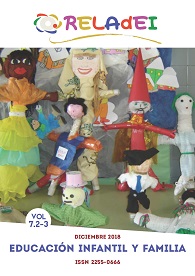Vol 7 No 2-3 (2018): Educación infantil y familia, Monográfico/Tema del mes
Abstract
Although paternity is a responsible decision, it seems that improvisation and trial - error are the most commonly used strategies in family education. In the actual scenario of social and demographic changes parenthood has become more and more complicated. The main objective of these pages is to provide arguments to promote parental education. Parental education is understood as the educational action of awareness, learning, training and clarification of the values, attitudes and practices used by parents in the education of their children. The main modalities of parental support (home visiting, group and community care) are addressed, focusing attention on some parental education programs for families with children in preprimary education. These programs are being implemented both at the international and national level, in educational institutions or in other socio-educational spaces (e.g. social and community services, associations, non-profit organizations), being a good support for the positive parenting approach. In recent decades, these programs have evolved according to the changes in conceptual approaches and parents’ needs (traditional, technical and experiential model). Similarly, the tendency of parenting on the Internet and the proliferation of virtual online training platforms are pointed out. The paper finishes highlighting parental skills improvement in those families which have participated in family support programs.
Keywords:
Positive Parenting, Parental Education, Parenting Programs, Family Support Modalities, Parental Education Models, Group Parental Education Programs, Parental Competences, Online Parental Support


